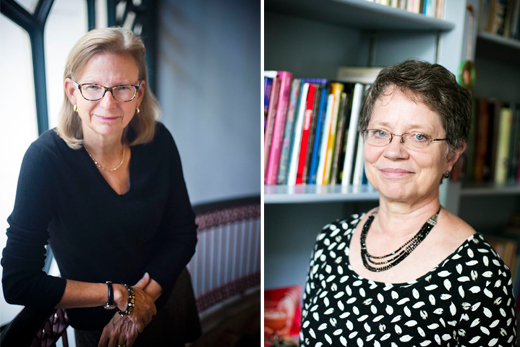Two Emory professors are among 178 scholars, artists and scientists honored with Guggenheim Fellowships for 2014.
Both of Emory's fellows—professor of religion Joyce Flueckiger and professor of art history Bonna Wescoat—are in the humanities.
For Flueckiger, the Guggenheim Fellowship will allow her to spend the 2014–2015 academic year writing "Material Acts: The Agency of Materiality in India," a book that will build on her three previous ethnographic research projects to examine a range of different kinds of material that are not usually included in the study of religion, such as saris and wedding pendants.
In her proposal for the Guggenheim Fellowship, Flueckiger says she will seek to "identify elements of an Indian worldview that contribute to the idea that physical objects and substances have their own agency, which human bodies may implement, but whose creative potential to act is not dependent on them."
"It is significant that this fellowship was awarded to me under the category of religion. My Ph.D. is in South Asian Studies and, initially, I had to make space for ethnography in religion, but now this is something Emory is known for. To me, this fellowship is confirmation that this kind of work counts in religious studies."
For her Guggenheim project, "Insula Sacra: Samothrace and the Sanctuary of the Great Gods," Wescoat will draw on more than a quarter century of field experience on the Greek island of Samothrace to write a synthetic monograph on the mystery cult of the Megaloi Theoi, the "Great Gods," and its sanctuary, where she serves as director of excavations under the auspices of the American School of Classical Studies at Athens.
The work will focus "on the dynamic interaction of place and cult, situated within the broader context of religious experience, political dynamics, architectural developments, and social history of the Mediterranean from the first evidence of cult activity in the 7th century BC through rediscovery in the Renaissance," Wescoat says in her proposal for the fellowship.
"With the exception of its glorious Winged Victory, the Sanctuary of the Great Gods on Samothrace remains one of the best-kept secrets of the classical world," Wescoat says.
"The Guggenheim Fellowship gives me the opportunity to develop and write the book I have long wanted to write, looking at all of the ways the island and cult were important in antiquity. This book will mine the sanctuary for what it reveals about the cult, the Great Gods, and sacred experience, through the extraordinary visual power, aesthetic display, and transformative effect of its landscape, buildings, and dedications."

